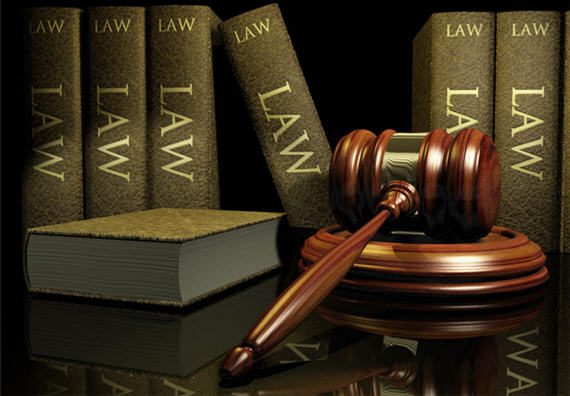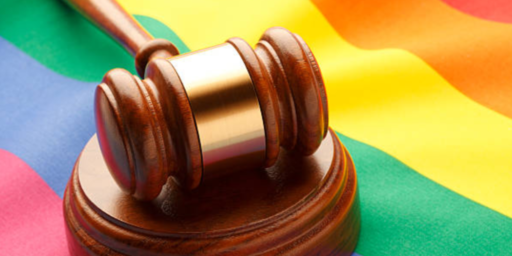Affirmative Action For The Unattractive?
Do the less attractive deserve legal protection? One University Of Texas Profess thinks so.
Daniel Hammermesh, an economics professor at the University Of Texas, had an odd piece in Sunday’s New York Times arguing that perhaps the government should do something to alleviate societal discrimination against the less attractive:
In addition to whatever personal pleasure it gives you, being attractive also helps you earn more money, find a higher-earning spouse (and one who looks better, too!) and get better deals on mortgages. Each of these facts has been demonstrated over the past 20 years by many economists and other researchers. The effects are not small: one study showed that an American worker who was among the bottom one-seventh in looks, as assessed by randomly chosen observers, earned 10 to 15 percent less per year than a similar worker whose looks were assessed in the top one-third — a lifetime difference, in a typical case, of about $230,000.
Beauty is as much an issue for men as for women. While extensive research shows that women’s looks have bigger impacts in the market for mates, another large group of studies demonstrates that men’s looks have bigger impacts on the job.
Why this disparate treatment of looks in so many areas of life? It’s a matter of simple prejudice. Most of us, regardless of our professed attitudes, prefer as customers to buy from better-looking salespeople, as jurors to listen to better-looking attorneys, as voters to be led by better-looking politicians, as students to learn from better-looking professors. This is not a matter of evil employers’ refusing to hire the ugly: in our roles as workers, customers and potential lovers we are all responsible for these effects.
Hammermesh says that his analysis is packed up by research, but even without consulting the research it’s easy to accept that he’s mostly right that personal appearance tends to benefit people in a number of ways. In many respects it likely doesn’t even happen on a conscious level since many of our conceptions of beauty and attractiveness are hard-wired to some degree. After all, the biological purpose of attraction is to propogate the species, and there’s been plenty of research to show that many of the things that human beings, especially males, find physically attractive are related to a potential mates ability to bear children. These perceptions do change over time to some degree, of course; one need only compare a Reubens painting and a Playboy Centerfold to see evidence on that. Nonetheless, it seems fairly apparent that our judgments regarding physical attractiveness, and how we respond to that, don’t always occur on a conscious level.
At the same time, though, it’s also clear that Hammermesh is wrong in his contention that physical appearance is purely a results of genetics, because there are clearly things we can do to improve ourselves in that area:
Unlike race, gender, or stature, your physical appearance is something you can, to some degree, control. For most people, looking conventionally attractive is a matter of regular exercise, effective grooming, and a thoughtful wardrobe. Perhaps taking care in your appearance signals greater diligence and respect for work. In most jobs it is necessary to dress the part, which may mean wearing a suit to work or (if you trade equities, slicking back your hair Gordon Gekko-style). Is good grooming any different? Mr Hamermesh studied the labour market outcomes of women in China. He found that greater spending on clothes and cosmetics increased the probability of classification as attractive, though there are diminishing returns on beauty spending.
If “attractiveness” is something you can control, at least partially, by proper grooming, dressing nicer, and presenting yourself with more of an air of self-confidence, then it seems to me that Hammermesh’s entire case starts to suffer. Despite this, and despite the lack of evidence that people are consciously choosing to discriminate against the less attractive, Hammermesh proposes far-reaching changes to the law in order to combat this perceived injustice:
A more radical solution may be needed: why not offer legal protections to the ugly, as we do with racial, ethnic and religious minorities, women and handicapped individuals?
We actually already do offer such protections in a few places, including in some jurisdictions in California, and in the District of Columbia, where discriminatory treatment based on looks in hiring, promotions, housing and other areas is prohibited. Ugliness could be protected generally in the United States by small extensions of the Americans With Disabilities Act. Ugly people could be allowed to seek help from the Equal Employment Opportunity Commission and other agencies in overcoming the effects of discrimination. We could even have affirmative-action programs for the ugly.
The mechanics of legislating this kind of protection are not as difficult as you might think. You might argue that people can’t be classified by their looks — that beauty is in the eye of the beholder. That aphorism is correct in one sense: if asked who is the most beautiful person in a group of beautiful people, you and I might well have different answers. But when it comes to differentiating classes of attractiveness, we all view beauty similarly: someone whom you consider good-looking will be viewed similarly by most others; someone you consider ugly will be viewed as ugly by most others. In one study, more than half of a group of people were assessed identically by each of two observers using a five-point scale; and very few assessments differed by more than one point.
For purposes of administering a law, we surely could agree on who is truly ugly, perhaps the worst-looking 1 or 2 percent of the population. The difficulties in classification are little greater than those faced in deciding who qualifies for protection on grounds of disabilities that limit the activities of daily life, as shown by conflicting decisions in numerous legal cases involving obesity.
There are other possible objections. “Ugliness” is not a personal trait that many people choose to embrace; those whom we classify as protected might not be willing to admit that they are ugly. But with the chance of obtaining extra pay and promotions amounting to $230,000 in lost lifetime earnings, there’s a large enough incentive to do so. Bringing anti-discrimination lawsuits is also costly, and few potential plaintiffs could afford to do so. But many attorneys would be willing to organize classes of plaintiffs to overcome these costs, just as they now do in racial-discrimination and other lawsuits.
Trust me, Hammermesh is absolutely right about the fact that if the legislatures or the Courts create a new civil right to protect the ugly, homely, or just slightly unattractive, there will be plenty of my fellow members of the bar lining up to representing them in lawsuits of any number of manifestations. Employment discrimination suits. Housing discrimination. Education discrimination. Spurning of romantic affections. The possibilities are endless, as are the numbers of lawyers who would be lining up to exploit this newly created “right,” not so much to help people but to enrich themselves. The “ugly people” class action firms would be all over television advertising their services. It would, in the end, be a legal minefield and a completely disaster.
It also strikes me that singling out the less attractive as a class deserving of protection would only serve to reinforce the negative feedback that society sends regarding body image. We already live in a society where beauty is so highly prized and celebrated that it leads young women, and some men, to go drastic means to try to live up to what is, in the end, an unrealistic image not only for them individually but for people as a whole. Creating a set of laws that tells people that “you’re so unattractive that you need government help” would only reinforce that negative feedback, it seems to me, with predictable consequences. Rather than equalizing the playing field, the world that Hammermesh wants to create could have the perverse, but predictable, impact of making things even more “unequal.”
Finally, if we’re going to provide a new legal right to the less attractive, then why not other people suffering from physical attributes that may hinder their economic and social progress. As Ellen Meade points out, there are also studies that show that short people suffer from similar unconscious “discrimination.” Should we also be compensating them? What about less intelligent people? Or people who speak English with a non-standard accent? Where, exactly, does this repairative justice that Hammermesh is advocating for the unfortunate looking end? And, most importantly, must every “unfairness” be remedied?
In short, I think the answer is clearly no. Yes, the buxom blonde and the guy with the James Bond looks is going to have it “better” than others sometimes, but, quite honestly, that’s life, and life isn’t always fair. Some of us will be better athletes, or better artists, or smarter, or more extroverted, and, yes, some of us will be more attractive. What we do with these genetic “gifts” is up to us, but the fact that some people are “better” than others is some respect is just a happenstance, not an injustice. And it sure as heck isn’t a reason to get the lawyers, ,or the government, involved.






Some people really need to get a life. Whats next? Affirmative action for short balding aging men?
I thought it was an interesting piece that was meant to make people think, as opposed to something that was really intended to advocate affirmative action for unattractive people.
Many people seem to support, or at least be indifferent to, the idea of affirmative action, etc. for minorities. But most of those same people would probably consider affirmative action for the unattractive to be ludicrous. Why? Is it really different? If so, what is different?
I think the answer is not just that we can improve our attractiveness to some degree.
Most of glamour is good grooming. Most celebrities (female, anyway) do not look extraordinary (in the face) until they are properly made up. Cameron Diaz comes to mind. But overall, a slim to moderately fleshy body, modest to good face, and decent clothing will make someone appear to be conventionally attractive.
My problem is who defines unattractive? My unattractive may not be your unattractive. It’s also true that unattractive can be a choice – a matter of personal hygiene and grooming. One of the major factors in unattractiveness is obesity – this more often than not is the result of personal choices.
By and large this is absurd.
@Sam: There are already rules on aging men although they are impossible to enforce.
I’m going to sue the face off of……uh, well. I’m gonna sue someone, because Cameron Diaz won’t do me like a wild one morning, noon and night. Its clearly discrimination.
This is absurd. And Anon, Micheal Medved had the prof on his show yesterday. This is no thought piece. The guy is on the edge of hysteria in his belief.
Has there ever been a better reason to abandon tenure?
The idea is ridiculous, sure.
Has there ever been a better reason to abandon tenure?
Hahahahahaha. Because one guy has a nutty idea?
There are likely *many* better reasons to abandon tenure.
Could this all be an act by the professor in an attempt to show how silly he thinks affirmative action is?
FINALLY! An affirmative action program for me!!!
kind of interesting that the next story on this site is about Ginsberg.
Left-wing academia purely would be ugly if it weren’t so scary stupid.
I’m reminded of the old saw that politics is showbusiness for ugly people.
I like how this guys is thinking. I originally heard the piece on the Allan Handleman show on WZTk 101.1 in Raleigh. It does allow you to see how absurd the affirmative action policy really is. While I don’t doubt it had its purpose, the reason I like the ugly discrimination better is that it covers more people, with all races, gender, nationalities, and creeds.
There are many studies out there that prove or define what is attractive and what is not. Do a little research and you will see that obesity is one trait that is typically left out of the ugly discrimination. Look at things like symmetrical features in the face, ie eye placement, round or square shaped head, ears that match the body, the size and placement of the nose, etc etc etc. This guy makes valid points although I don’t agree with making more government regulations, even though I would fall in the category that would be protected.
Mr. Mataconis, you seem to get rather confused about the issue in your last paragraph. That a person is born black (or ugly) is happenstance, as you say, and happenstance is neither just nor unjust, again, as you say. The injustice occurs when the person involved is subsequently and systematically subjected to discriminatory behavior due to the happenstance circumstance, over which they had no control. The injustice does not exist “in” the happenstance circumstance itself, but results from it, and it is unjust because the victim had no control over the happenstance occurrence. What is the civil law for if not to restore equity to an inequitable situation?
One would expect a lawyer to make a better argument than what we see here.
Shades of Harrison Bergeron.
Shades of “Harrison Bergeron”? I think not. Perhaps an inversion of that story’s theme, though. In the case at hand it is the less capable that are forced to wear artificial handicaps that retard their achievements and due rewards.
If we treat less attractive people as lesser people generally is that a moral or immoral act? If it is immoral then we have a duty to address it as such. The fact that it may be difficult to implement a practicable solution is no defense to inaction.
No one is suggesting that the beautiful must disguise their beauty, or that genius must hide it’s talent. We are considering raising an arbitrarily lowered floor, not lowering the ceiling of those who stand tallest. Equal access to monetary reward, not equal outcomes is the goal.